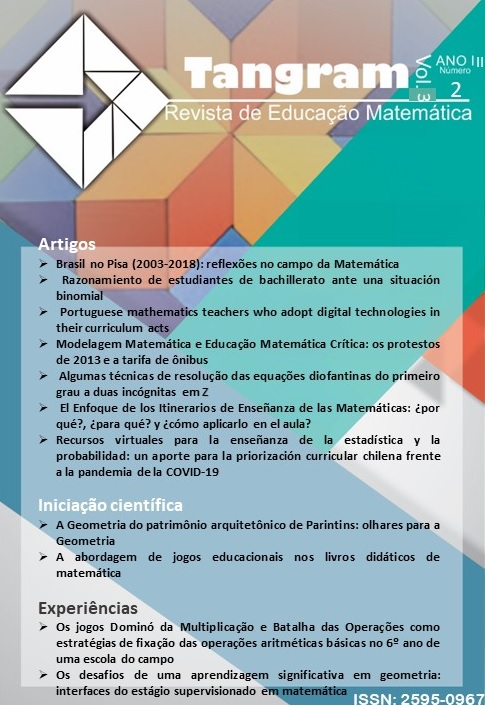The games Multiplication Dominoes and Battle of Operations as strategies for fixing basic arithmetic operations in the 6th grade of a rural school
DOI:
https://doi.org/10.30612/tangram.v3i2.10963Keywords:
Mathematical games. Mathematics teaching and learning. Rural education.Abstract
The article aims to present and analyze the games “Battle of Operations” and “Multiplication Dominoes” in a 6th grade of an Elementary School placed in a rural district, in the city of Rio Pardo de Minas, northern region of the state of Minas Gerais. We seek to analyze how games are used as a way of teaching and learning involving concepts and skills linked to the four basic arithmetic operations. For that, we report the experience developed, including observations about how students worked during the activities and their respective contributions to the Mathematics teaching in the rural context. The use of games showed advantages, such as quick thinking in solving questions involving the four arithmetic operations. As negative issues, we pointed the noise with a tendency to euphoria during activities of this nature, in addition to the time needed to work with just one game.Downloads
References
Barreto, D. E. S., & Oliveira, M. H. P. (2016, julho). Educação de jovens e adultos: jogos e aprendizagem matemática. Comunicação Científica apresentada no Encontro Nacional de Educação Matemática, São Paulo, SP, Brasil, 12. Recuperado de http://www.sbem.com.br/enem2016/anais/pdf/4728_2629_ID.pdf
Grando, R. C. (2004). O jogo e a matemática no contexto da sala. São Paulo: Paulus.
Oliveira, A. F., & Magalhães, A. P. D. A. S. (2016, julho). Jogos matemáticos: o relato de uma experiência desenvolvida no ensino fundamental a partir das aulas de Didática. Relato de Experiência apresentado no Encontro Nacional de Educação Matemática, São Paulo, SP, Brasil, 12. Recuperado de http://www.sbem.com.br/enem2016/anais/pdf/4872_2273_ID.pdf
Passos, C. M. S. M., & Pudelco, M. S. (2016, julho). Contribuições para a prática docente: a resolução de problemas e os jogos matemáticos no ensino de operações matemáticas. Relato de Experiência apresentado no Encontro Nacional de Educação Matemática, São Paulo, SP, Brasil, 12. Recuperado de http://www.sbem.com.br/enem2016/anais/pdf/6202_2949_ID.pdf
Rossetto, E. R. A., & Silva, F. T. (2012). In R. S. Caldart, I. B. Pereira, P. Alentejano & G. Frigotto (Orgs.), Dicionário da Educação do Campo (Ciranda Infantil, pp. 125-130). Rio de Janeiro: Expressão Popular. Recuperado de http://www.epsjv.fiocruz.br/sites/default/files/l191.pdf
Silva, M., Franco, M., & Silva, A. (2019). Alfabetização e letramento na educação do campo: Jogos Didáticos e Atividades Contextualizadas com os Saberes Campesinos. Tópicos Educacionais, 25(2). Recuperado de https://periodicos.ufpe.br/revistas/topicoseducacionais/article/view/244544
Shcavaren, M. B. B. (2016, julho). Alunos do ensino médio ensinando alunos do ensino fundamental: uma experiência com jogos matemáticos. Relato de Experiência apresentado no Encontro Nacional de Educação Matemática, São Paulo, SP, Brasil, 12. Recuperado de http://www.sbem.com.br/enem2016/anais/pdf/6207_3472_ID.pdf
Trobia, I. A., & Trobia, J. (2016, julho). Jogos matemáticos: uma tendência metodológica para ensino e aprendizagem de matemática. Relato de Experiência apresentado no Encontro Nacional de Educação Matemática, São Paulo, SP, Brasil, 12. Recuperado de http://www.sbembrasil.org.br/enem2016/anais/pdf/4743_2260_ID.pdf
Yin, R. K. (2016). Pesquisa qualitativa do início ao fim. Porto Alegre: Penso.
Downloads
Published
How to Cite
Issue
Section
License
Authors must accept the publication rules when submitting the journal, as well as agree to the following terms:
(a) The Editorial Board reserves the right to make changes to the Portuguese language in the originals to maintain the cultured standard of the language, while respecting the style of the authors.
(b) Authors retain the copyright and grant the journal the right to first publication, with the work simultaneously licensed under the Attribution-NonCommercial-ShareAlike 3.0 Brazil (CC BY-NC-SA 3.0 BR) that allows: Share - copy and redistribute the material in any medium or format and Adapt - remix, transform, and create from the material. CC BY-NC-SA 3.0 BR considers the following terms:
- Attribution - You must give the appropriate credit, provide a link to the license and indicate whether changes have been made. You must do so under any reasonable circumstances, but in no way that would suggest that the licensor supports you or your use.
- NonCommercial - You may not use the material for commercial purposes.
- Sharing - If you remix, transform, or create from material, you must distribute your contributions under the same license as the original.
- No additional restrictions - You may not apply legal terms or technological measures that legally restrict others from doing anything that the license permits.
(c) After publication, authors are allowed and encouraged to publish and distribute their work online - in institutional repositories, personal page, social network or other scientific dissemination sites, as long as the publication is not for commercial purposes.






